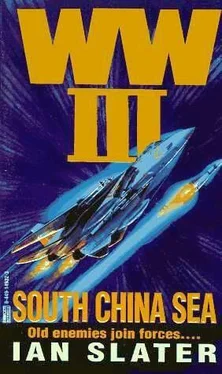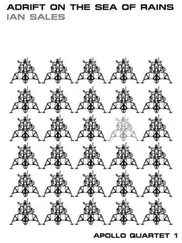“One more thing,” Danny reminded them. “Be careful with the machine guns. I mean, when we break out, it’ll make one hell of a big hole for all our fellow POWs to run through. That’s good for everybody. PLA’ll have to look for two hundred of us if there’s a mass break, and every POW in here knows the importance of the Ningming-Dong Dang railroad.”
Having said his piece, Danny now turned his attention to the sky. It had always amazed him how cloud formations change in seconds, that the patch of sky you’ve been watching changes completely in five minutes. It was something he’d had ample time to notice while working, like Mike Murphy and the other POWs, on the rigs in the South China Sea, something that most people in normal, everyday life didn’t notice. There was such a change occurring now, the moon’s face becoming obliterated as anvil-shaped cumulus piled up. Where seconds before there had been a brilliant orb, there were now only dark storm clouds. Soon it began raining. There was nothing gradual about it — it simply fell in buckets, as was its wont in the region.
Then he saw lightning, and a moment later it seemed as if God’s artillery had opened up, the thunder so powerful they could feel it rumbling in the hut, rattling the locked door. Danny Mellin and three others, including Murphy, picked up the base of one of the bunks, counted in unison, “One, two,” and smashed it into the wall where the rice had formed much of the mortar. Immediately they could feel that several bricks had been displaced by the shock of the bunk base, the air pockets around the grains of rice having substantially weakened the mortar between the bricks.
Waiting for the next roll of thunder, they counted and hit it again. There was choking dust, and three of the ramming squad were on the floor. Mike was stuck halfway through the hole, his knuckles badly lacerated. But he felt the rain pouring on his head and murmured, “Christ, we’re through! We’re fucking through!” It was a ragged hole about three feet in diameter.
“Quick,” Mellin ordered. “Get to the wire.” There was another flash of lightning, during which the hole was brightly illuminated. Then there was another rolling barrage of thunder as the ten of them quickly got through the hole and within seconds were at the wire.
As Murphy cut the first strand, there was a rustling sound as the tension of the wire gave way, but the noise was drowned out by the gut-churning rolls of thunder and the hiss of the rain. Soon they were halfway through the concertina wire. Murphy stopped and listened for the sentries. He couldn’t see any in the rain-riven darkness, nor could he hear them, given the noise of the storm. Murphy cut more wire, stopped and listened, and all he could hear was his heart thumping. Soon, within seven minutes of reaching the razor wire, all ten of them were through, five turning left, the other five to the right.
Both teams, Murphy in charge of the first squad, Danny the second, all crouching low, moving along the outer wire, were astonished not to find any guards.
“Probably in the trucks,” Shirley whispered.
“Hope to Christ they haven’t locked the doors,” Murphy whispered in return. “Shirley, stay with me. You too, Frank. The other three of you go around to the passenger side.”
The sound of the rain was drumming on the truck’s canopy, rivulets of water running down the fenders and streaming off the running boards. Suddenly, Murphy saw a red spot dancing about in the cabin, someone in the cabin smoking, nice and comfy out of the rain.
“Now!” he said in a hoarse command, wrenched open the driver’s door, and pulled him out. Already three others of Murphy’s crew were up in the back, while the other guard, on the passenger side, who had also been smoking, was on the sodden ground begging for mercy. Shirley hesitated, so Murphy hit him with the brick — once — as he had the driver. “Frank, you man the machine gun, Shirley, you’re navigator. Let’s go.”
The moment Murphy felt the keys in the ignition, he couldn’t contain his excitement. “Jesus loves me!” He pumped the gas pedal twice and turned the key. The truck started to life, running roughly but going.
He drove the truck halfway down the wire, his parking lights on, and saw Danny’s truck, or rather its two orange eyes, approaching him. Shadowy figures jumped from both trucks and quickly hooked wire to their tailgate. But before starting northward for the secondary road west of Ningming, both trucks now swung their machine guns about and waited till the next flash of lightning, then fired at the four trucks around the administrative block.
It was about ten seconds before one of the trucks caught fire, and from then on they were easy sport for the two gunners. Another truck lurched hard to its right, tires now in shreds, the windscreens and engines of the other two shot through with full bursts of 7.62mm. The remaining two corner PLA trucks could be heard starting up, but they too were shot up in the surprise enfilade of fire from the two prisoner-commandeered vehicles.
There was pandemonium as lights came on in the administration building, only to disappear in the sound of crashing glass as Danny’s and Murphy’s machine guns raked the building at practically point-blank range, the temporary lights in it a perfect aiming point. Now, in the madly dancing glow of the burning trucks, Danny’s and Murphy’s teams could see scores of prisoners streaming out from what had been Danny’s hut, using bunk beds to ram the front doors of the other huts. More prisoners came out and raced for the five-yard-wide corridor through the razor wire.
Danny and Murphy knew it was time to go, a dozen or so prisoners clambering aboard as the wire on the two trucks’ tailgates was disconnected, the trucks heading off on the POW camp-Ningming road, sporadic AK-47 fire from the compound spitting into the night.
* * *
On Disney Hill, sixteen miles south, Colonel Melbaine’s counterattack had regained the hill’s summit by dark. The heavy rains slowed the USVUN advance in the later afternoon, but it sealed the fate of the Chinese tunnels on the north side, which were now no more than drainage conduits, their integrity gone because of the severe structural damage done to them by the heavy U.S. TACATR and artillery fire the day before.
Even so, Melbaine knew that if General Wei could be resupplied fast enough and with enough fresh troops, of which he had many more than the USVUN, it could quickly become a stalemate again, followed by another retreat by the Americans and their allies. And though Melbaine was a toughened combat veteran whose sole job was the conduct of war, he knew as well as Freeman did the symbolic, political importance of pushing the Chinese beyond Disney Hill to the 22nd parallel, beyond the border, to unequivocally signal the defeat and not merely the rout of the Chinese.
But if the big question for Freeman was enemy resupply — a danger that might once again push his troops back — the pressing danger for Danny Mellin’s escapees was whether anyone two miles away at the Ningming airfield had seen the explosion of the trucks in the POW compound. It was more man likely that the thunderstorm and downpour had muffled or completely drowned out the sound of their explosions, but it was just as certain that the brief firefight at the compound had been reported to the PLA guard contingent at the Ningming airfield.
* * *
The moment General Wei heard reports of an “attack” around Ningming, he immediately took it to be an Anglo-American special ground forces attack on his left flank behind his lines, specifically targeting the Ningming railhead, since Wei knew full well that the U.S. President had forbidden any air interdiction inside Chinese territory. From Wei’s position, the enemy ground force was obviously trying what the Americans called an end run: bypassing the bulk of his PLA troops at Disney and trying to disrupt his vitally needed Ningming-Xiash-Pingxiang-Dong Dang supply line.
Читать дальше












